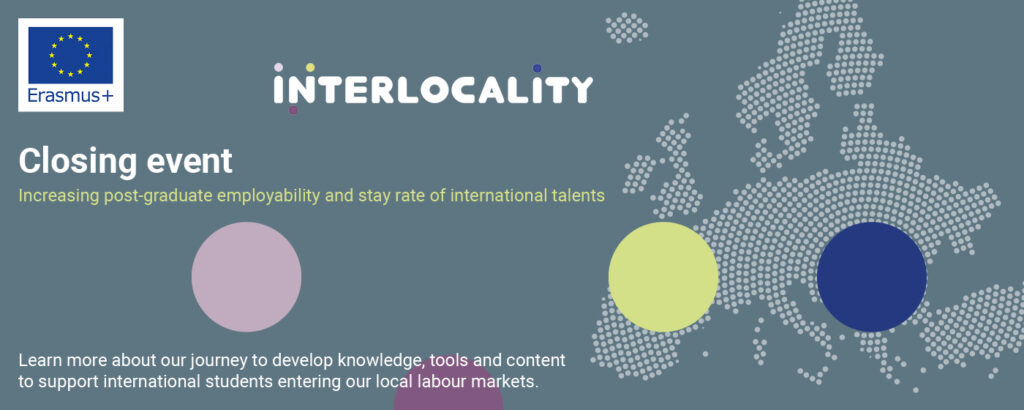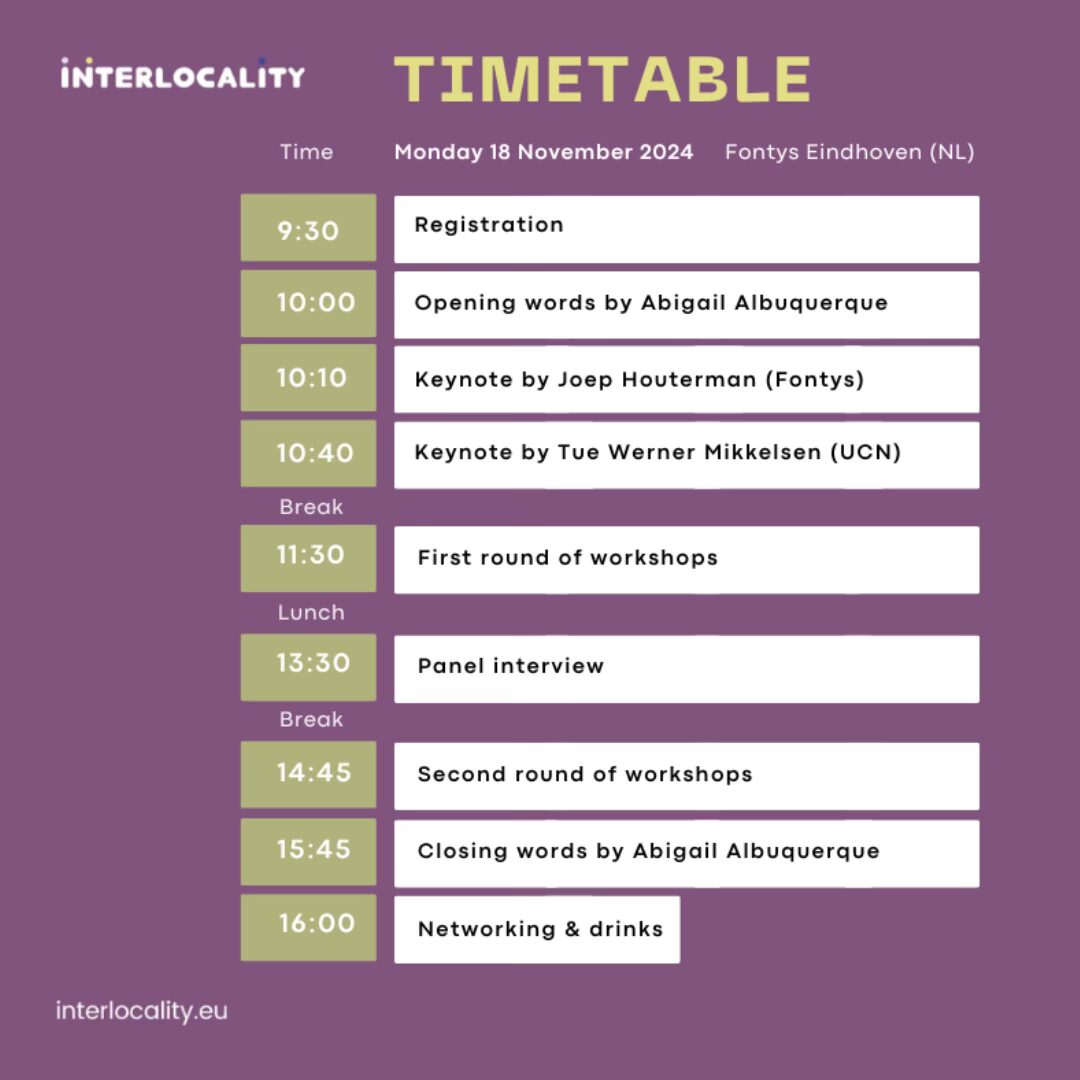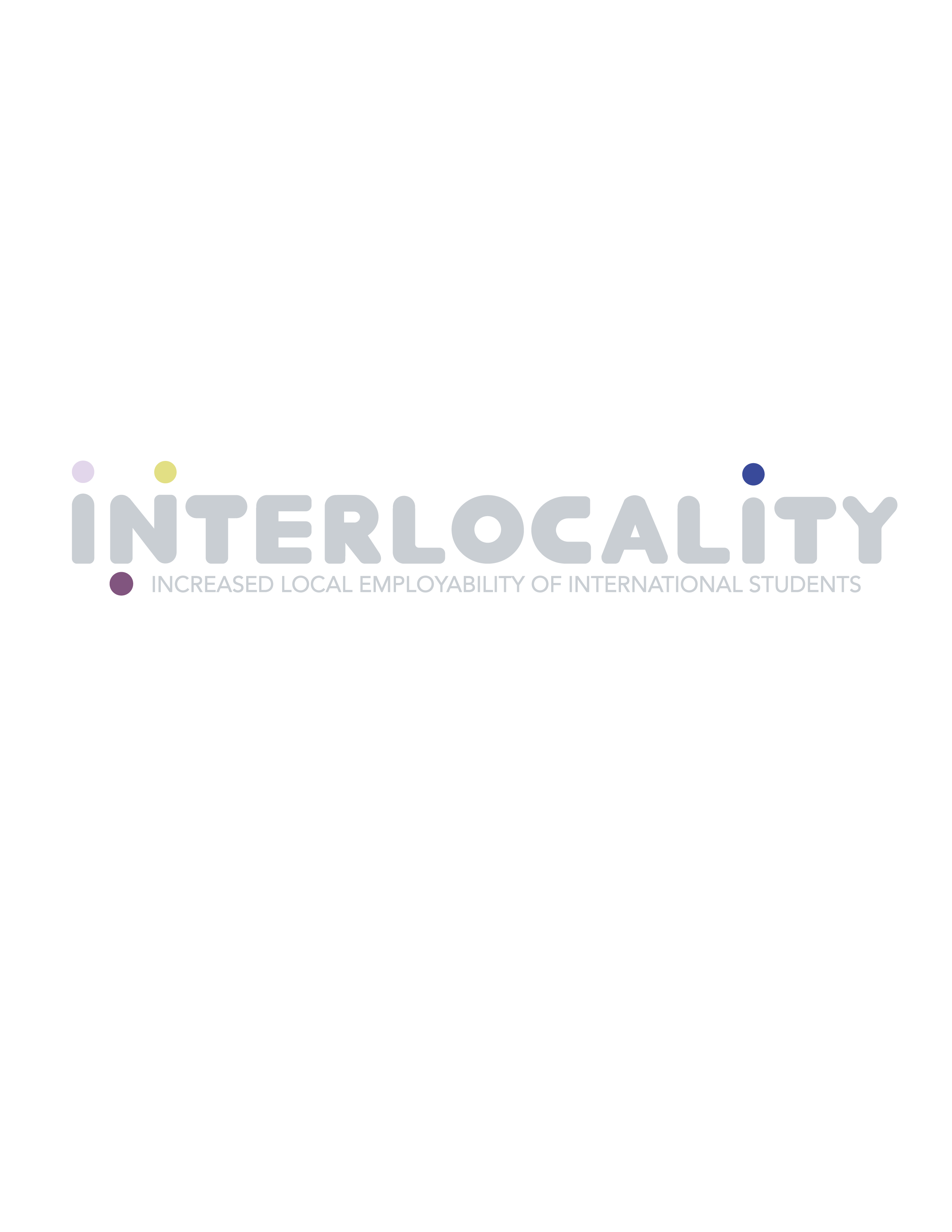
Please be aware that on Monday, the 18th, public transport may experience delays due to railway strikes between 6:00 and 9:00. If you choose to travel by car, you can park at the Fontys campus (Rachelsmolen). However, please note that parking may be limited and there could be a queue to enter the parking garage. We have a limited number of free exit tickets available. Alternatively, you can park at Eindhoven University of Technology (paid parking, with no exit tickets available). Please plan for additional walking time if you choose to park there.
International degree students often struggle to find internships and employment locally/in the region they study. In 2022 UCN, Arcada, FH Munster, SEND and Fontys UAS joined forces to increase the stay rate of their international students. During their 3-year research project INTERLOCALITY the consortium gained insight into the main obstacles of students, employers, UAS and third-sector organisations in increasing the local employability of their international students. They developed a monitoring tool, a system for systematic guidance of these students and online modules to increase the knowledge of lecturers, employers and others involved in the labour market issues of international students.
We are organising an event to present the outcomes of our activities and the tools we developed. The programme includes a plenary session in the morning and interactive workshops in which practical tools and tips will be shared.
There is ample space to learn from many other participating higher education institutes and regions and their successes in improving the local employability of international students.
For a select group of international attendees, we are offering a highly exclusive session on increasing the stay rate, conducted by Nuffic (The Dutch organisation for internationalisation in education) on Tuesday, the 19th.
If you want to attend the event, please fill out the registration form, and we will keep you informed about the programme, location, and other practicalities.
Programme information
The multiplier event of the INTERLOCALITY project features on 18 November keynote lectures, parallel workshops and a panel interview, giving participants access to a range of topics within the field of international student employability. Each interactive workshop includes a presentation of the INTERLOCALITY subproject and its results, sharing practical tools and tips. These tools take different forms and are intended for different stakeholder groups, but are all created to have a positive impact on the employability of international degree students.
This multiplier event may be of interest for staff of Higher Education Institutions, third-sector organisations and employers who are dealing with international students or international employees. The presented outputs are developed in a way that they can be adapted to different contexts and needs, making them transferable at a European level. Via the multiplier event, the INTERLOCALITY consortium hopes to inspire the practice and policies of the participants, creating a positive impact on the retention and employability of international students all over Europe. For this, the event will also include ample time for discussion and informal interactions between participants from all over Europe, providing an opportunity for attendees to make and renew acquaintances, and to ensure a lively exchange of ideas.
On 19 November, for a select group of international attendees, Nuffic, the Dutch organisation for internationalisation in education, will host a session on increasing the stay rate of international students in the host country after their graduation.
For more detailed information on the different workshops, see the corresponding section.
18 November
Keynote Speakers
- Joep Houterman, President of the Executive Board of Fontys University of Applied Sciences
- Tue Werner Mikkelsen, INTERLOCALITY Project Lead and International Consultant Employability & Retention at University College of Northern Denmark (UCN)
Panel Interview
During the panel interview, international students and alumni will ask different stakeholders (policymakers, local employers, HEI professionals, staff from third sector organisations) questions on the topic of international students’ employability and what these stakeholders can contribute to it. This to stimulate the discussion about who can actually bear responsibility for an adequate landing of internationals on the local labour market, and in what way.
Workshops
1. An International Student’s Road to Employability – The Game
In this workshop, Luc Hameleers and Loes van Beuningen, researchers at Fontys, will present their tool – An International Student’s Road to Employability. It is a board game that takes players through the full employability journey of international students, starting from choosing their study programme. It concludes with finding a suitable job on the local labour market after completion of the study programme in the host country. The tool offers insights into the difficulties and successes experienced within this trajectory, in a playful way. In addition, the tool provides guidance into where and when the international student needs help and offers concrete advice on what support is needed to increase the local employability of international students. The tool is based on the research information collected during interviews with international students held for the INTERLOCALITY project.
2. I AM Talent: Supporting International Students and Alumni Developing Employability
In this workshop, Dick Siesling and Marian Thunnissen, researchers at Fontys, will present the I AM Talent tool, diving deeper into a way to support international students and alumni on their road to employability. The I AM Talent tool, based on an extensive theoretical framework, offers HEI’s the possibility to customise the road to employability of their students by linking different existing tools, websites and other information to a platform. This enables regular Personal Professional Development programmes to go to a next level! In this workshop, the experiences and lessons learnt from the pilot of the I AM Talent tool within Fonty are shared. Participants are also asked to discuss on the topic; How can the I AM Talent tool be used by international students and alumni in your context? How can international students be supported to find all the necessary information, tools or tips during their journey from orientation, qualification, networking to landing on the local job market? The tool is based on the research information collected during interviews with international students and HEI staff held for the INTERLOCALITY project.
3. The International Talent Journey
In this workshop, Sarah Schönfelder, Nadine Pantel and Anna Hölscher of FH Münster will present the structured qualification process called ‘International Talent Journey’. It is based on the identified need of HEI’s for a more guided process that equips international degree students with the necessary skills to enter the local labour market. The concept consists of a coaching and qualification process for international students in several stages, starting with an assessment. Subsequently students participate in six events from the Employability Activities Catalogue, which helps them gain important skills in finding a job and getting to know regional employers. Successful participation may lead to a Career Certificate after a second assessment. In the workshop, this concept of addressing the gap between international students and the local labour market from this theoretical qualification point of view will be discussed.
4. Unlocking Employer-Ability: Bridging the Gap between International Students and Host Country Employers
In this workshop, Sandra Slotte, senior policy advisor at Arcada, explores the concept of employer-ability and what the roles of higher education institutions, third sector organisations, and employers can be in developing it. She will use the online courses developed in the INTERLOCALITY project as base for the workshop and as a tool that can be used moving forward in your own context. The concept of employer-ability stems from the need for balancing the responsibility of employability. The employability narrative places all the responsibility on the individual; the international student or graduate. However, despite labour shortages, international students are often disadvantaged in the host country labour market compared to their local peers. Thus, the support for developing the employability of the international students and graduates needs to be balanced with that for supporting the development of employer-ability among the host country employers, e.g. employer willingness, ability, capability and readiness to employ international talents.
5. Intercultural Sensitivity Training: DECENTRATION WORKSHOP – connecting perceptions of reality, feelings and values for better intercultural interactions.
Given the acknowledged relevance of the links between intercultural sensitivity/intelligence and emotional intelligence, as well as the importance of self-awareness in both domains, we propose a powerful self-reflection activity that helps participants to shift the emphasis from the others’ behaviours to our own reactions. This interactive workshop – based on the Critical Incidents Methodology developed by the social psychologist Margalit Cohen-Emerique – helps participants to fully experience what cultural glasses are, starting from a reflection on how we perceive reality, experience feelings and embrace values. Indeed, intercultural misunderstandings are often triggered by (mis)perceptions, and the Cohen-Emerique approach outlines the illusion of cultural neutrality, opening up a margin for negotiation and understanding where prejudices are identified and addressed. It is a formidable introspective activity that can be easily replicated by participants in their working contexts.
6. Why Do International Students Stay after Graduating and What Helps Them in Finding a Job
In this workshop, Nuffic will present the key factors influencing international alumni’s decisions to stay in the Netherlands after graduation. Nuffic’s recent research, combining interviews and survey data, sheds light on important aspects like quality of life, career opportunities, and social networks. The challenges these graduates face will also be discussed, such as finding suitable work and housing, and the support systems that can aid their integration, including financial support, Dutch language skills, and effective networking. Gain a deeper understanding of what helps international alumni feel at home and succeed in the Netherlands, as these findings can also be applicable to other European countries.
7. Enhancing International Talent Attraction through Place Branding
In this workshop, Brainport Development will explore the strategic use of place branding to attract the smartest minds. Drawing on their expertise, the economic development agency of the Brainport Eindhoven region will elaborate on how they have been working with universities and local employers to boost the region’s international recruitment efforts. This workshop will highlight how collaborative efforts can significantly improve the international talent journey to the region. Participants will learn how to leverage place branding to create a compelling narrative that attracts international talent, understand the key factors influencing decision-making, and develop strategies to retain these international talents throughout their academic and professional journeys. This session will include a mix of lectures, case studies, and interactive discussions, ensuring that attendees leave with actionable strategies and a strong network of like-minded professionals.
19 November
Nuffic Workshop #Study #Stay #Work
10:00 – 15:00
Do you want to know how you as a higher education institution can help increase the stay rate of international students after graduation? Then come to the #Study #Stay #Work workshop organised by Nuffic, the Dutch organisation for internationalisation in education.
During this informative and interactive workshop, Nuffic will reflect on their research on the topic. The insights from Nuffic’s mobility, retention and employer surveys will be shared. In addition, the multiple ways higher education institutions may shape their stay rate, and what they need from local companies and the government to retain more of their international students for the local labour market will be discussed. Nuffic will also share the good practices regarding this topic from their network.
Participants will be invited to discuss their stay rate increasing practices regarding international students and alumni, so that participants can learn from each other and Nuffic’s research.
The programme may be subject to change.


Interesse!
I have sent in the registration form for the event on 18 November. Can you also add and confirm my participation in the Nuffic Stayrates event on 19 November?
Thanks in advance.
Yours,
Bert Kamphuis
Senior policy advisor internationalisation
Zuyd University of Applied Sciences
Dear Bert,
Yes, we will make sure to include you in the programme on Tuesday 19 November as well.
Best Regards,
Tue Werner Mikkelsen
University College of Northern Denmark / INTERLOCALITY Team
Hi, seems the registration is closed. I am interested to participate. Kindly assist with registration.
The register button is not working. I also tried to contact you about de-enrolling for the Tuesday, but still no response. Please communicate!
Good morning,
I am not sure if I have registered for the event. Could you please register me (again)?
Senior Lecturer/Internship Coordinator/Account manager Denmark and Finland
Saxion Career Services Project member
Saxion University of Applied Sciences | Hospitality Business School
Handelskade 75 | Postbox 501, 7400 AM Deventer| Room B2.57
M: + 31 (0)6 455 92928| t.alekseeva@saxion.nl